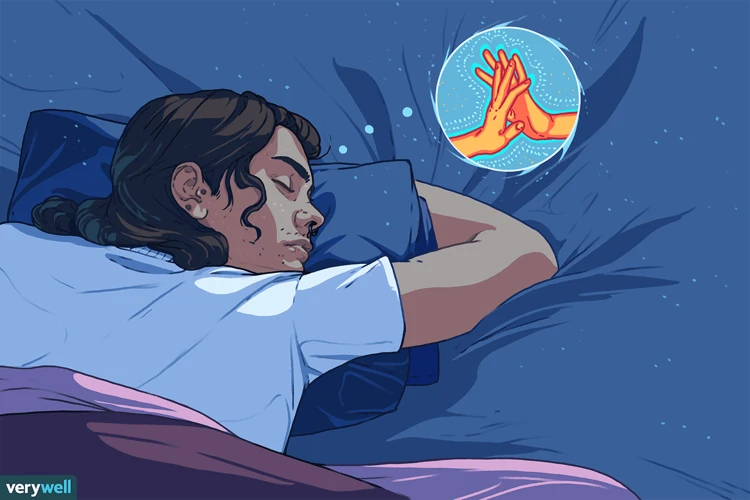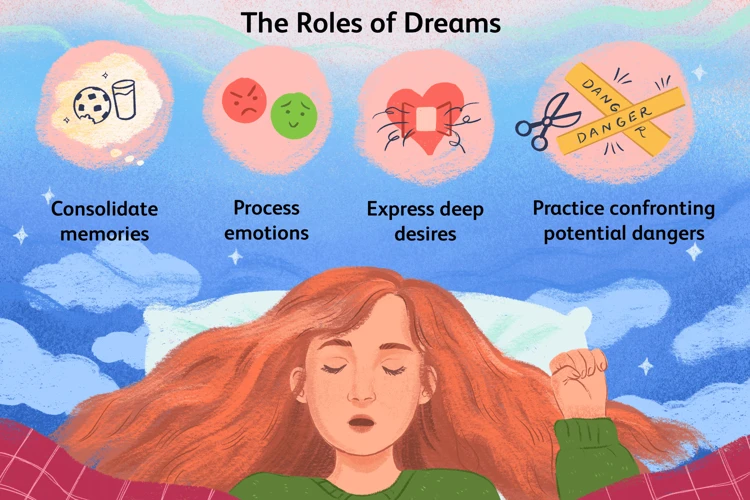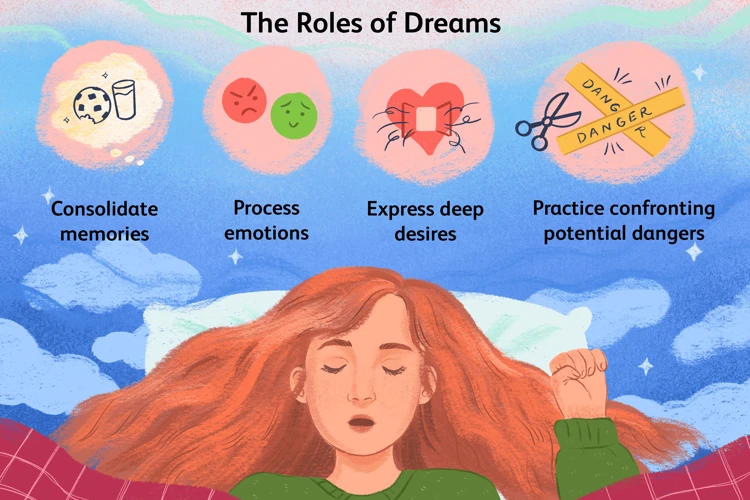Our dreams have always been a source of fascination and mystery. They offer glimpses into our subconscious, allowing us to explore hidden desires, fears, and emotions. Among these dreams, sexual dreams hold a special place. They can be intensely vivid and provocative, leaving us with lingering questions about their meaning and significance. In this article, we delve into the captivating realm of sexual dream symbols, exploring the impact of culture and upbringing on their interpretation. Through a journey of introspection and understanding, we aim to shed light on the intricate interplay between our personal experiences, societal influences, and the realm of our deepest desires.
Why Do We Dream About Sex?

Sexual dreams have long intrigued psychologists and researchers, and their significance can vary widely depending on individual experiences and cultural backgrounds. There are several reasons why we may dream about sex. Firstly, sexual dreams may be a reflection of our universal nature as sexual beings. Our dreams often tap into our primal desires and instincts, allowing us to explore and express our repressed or unfulfilled sexual desires. Secondly, personal experiences and emotional associations play a significant role in our dreams. Traumatic experiences or past relationships can result in sexually charged dreams as the brain processes and tries to reconcile these experiences. Finally, dreams about sex can also be a manifestation of our subconscious desires and fantasies, providing an outlet for exploration and self-expression. While the interpretation of sexual dreams can be complex and subjective, they offer valuable insights into our innermost thoughts and desires. For more information on the emotional intimacy and sexual dreams click here.
1. Universal Nature of Sexual Dreams
Sexual dreams have a universal nature, transcending cultural boundaries and societal norms. Regardless of our cultural upbringing or personal experiences, dreams about sex are common among individuals from diverse backgrounds. These dreams can be seen as a reflection of our innate human sexuality. From a psychological perspective, sex is a fundamental aspect of human existence, and our dreams often tap into this primal desire. They provide an outlet for exploring and expressing our repressed or unfulfilled sexual desires. Sexual dreams can also serve as a means of processing and integrating various experiences and emotions related to sexuality in our waking lives. They offer a space where we can freely explore our fantasies and experiment with different sexual scenarios. However, it is important to note that the interpretation of sexual dreams should not be taken as literal representations of our waking desires or intentions. Rather, they offer glimpses into the complex tapestry of our subconscious mind. To learn more about interpreting sexual dreams, you can read our article on interpreting sexual dreams. Understanding the universal nature of sexual dreams can help us embrace and appreciate the intricacies of our innermost desires and emotions, allowing for personal growth and self-acceptance. For more information on subconscious desires and sexual dreams, you can visit our article on subconscious desires in sexual dreams.
2. Personal Experiences and Emotional Associations
Our personal experiences and emotional associations heavily influence the content and meaning of our sexual dreams. Each individual has a unique set of experiences, memories, and emotions that shape their dream symbolism. For example, a person who has had a positive and fulfilling sexual relationship may have sexual dreams that reflect feelings of pleasure, intimacy, and connection. On the other hand, someone who has experienced trauma or sexual abuse may have dreams that are more distressing or disturbing in nature. These dreams may serve as a way for the brain to process and make sense of these past experiences, allowing for healing and resolution. Our emotional associations with certain individuals or situations can also impact our sexual dreams. For instance, a dream about sex with a former partner might not necessarily represent a desire to rekindle the relationship, but rather serve as a reminder of emotions or unresolved issues associated with that person. It is crucial to consider our personal history and emotional landscape when interpreting sexual dream symbols, as they provide valuable insights into our subconscious desires, fears, and unresolved emotions.
The Influence of Culture on Sexual Dream Symbols

Culture plays a significant role in shaping our understanding and interpretation of sexual dream symbols. Firstly, cultural taboos and sexual repression can influence the way we perceive and experience sex, both in waking life and in our dreams. Certain cultures may view certain sexual acts or desires as taboo or sinful, leading to feelings of guilt or shame when these themes appear in dreams. Secondly, cultural symbolism and definitions of sexuality vary across different societies. For example, a symbol that represents fertility and abundance in one culture may carry a completely different meaning in another. Finally, cultural myths and legends can seep into our subconscious, influencing the symbols and narratives that appear in our sexual dreams. These cultural influences remind us that dream interpretation is not a one-size-fits-all practice. It requires an understanding of the cultural context to fully comprehend the meaning behind the sexual symbols that arise in our dreams.
1. Cultural Taboos and Sexual Repression
Cultural taboos and sexual repression play a significant role in shaping our sexual dream symbols. Every culture has its own set of societal norms and values surrounding sexuality, which can create taboos and repressive attitudes towards sexual expression. These cultural taboos often stem from religious beliefs, moral constructs, or historical traditions. When individuals grow up in cultures that deem sex as shameful or inappropriate to discuss openly, they may internalize these attitudes and feel a sense of guilt or embarrassment regarding sexual desires or fantasies. This repression can manifest in sexual dreams where the individual may feel constrained, restricted, or even shameful about their sexual experiences or desires. Society’s expectations and pressures can also influence the symbols and scenarios that appear in sexual dreams. For example, in cultures that highly value monogamy or marital fidelity, individuals may have dreams about infidelity or cheating as a result of their subconscious conflicts with societal expectations. It is important to recognize and understand the impact of cultural taboos and sexual repression when interpreting sexual dream symbols and be mindful of the limitations and biases they may impose.
2. Cultural Symbolism and Definitions of Sexuality
Cultural symbolism and definitions of sexuality heavily influence the way we perceive and interpret sexual dream symbols. Each culture has its unique set of symbols, meanings, and associations surrounding sexuality, which can significantly impact our dream experiences. Cultural symbolism can vary widely, from the explicit to the metaphorical, and may be influenced by religious beliefs, societal norms, and historical context.
In some cultures, certain objects or animals may hold strong sexual connotations. For example, in ancient Greek culture, the serpent was often associated with sexuality and fertility. In contrast, some cultures may view objects or animals as symbols of purity or chastity. These cultural symbols shape our subconscious minds and can manifest in our dreams, giving rise to specific sexual dream symbols that are specific to our cultural upbringing.
Definitions of sexuality also play a crucial role in dreaming. Different cultures may have varying attitudes and beliefs about sexuality, which can shape our sexual dream symbols and experiences. For instance, cultures that repress or stigmatize sexual desires may lead to dreams filled with guilt, shame, or taboo scenarios. Conversely, in cultures where sexual expression is more accepted and encouraged, dreams may reflect a sense of freedom, exploration, and enjoyment.
Navigating the complexities of cultural symbolism and definitions of sexuality requires a nuanced understanding of both personal and cultural contexts. It is important to approach dream interpretation with an open mind, recognizing the potential influence that cultural factors may have on our dreams. By exploring the cultural symbolism surrounding sexuality and understanding its impact on our own dream experiences, we can gain deeper insights into our subconscious desires, fears, and beliefs.
3. Cultural Myths and Legends
Cultural myths and legends have a profound influence on our subconscious minds and can shape the symbolism of our sexual dreams. These stories, passed down through generations, often contain symbolic narratives and archetypes that are deeply ingrained in our collective consciousness. In many cultures, there are myths and legends that revolve around gods, goddesses, and mythical creatures with powerful sexual imagery. The symbolism associated with these figures can seep into our dreams, representing aspects of our desires, fears, and power dynamics in relation to sexuality. For example, in Greek mythology, the god Eros represents passionate love and desire, and dreaming of encounters with Eros may indicate a strong desire for intimacy and connection. Similarly, in Hindu mythology, the god Shiva is associated with both creation and destruction, and dreaming of encounters with Shiva may signify a transformative and powerful experience related to sexuality. Cultural myths and legends provide us with rich symbols and archetypes that can add depth and meaning to our sexual dreams, offering a unique lens through which we can interpret our subconscious desires and experiences.
The Role of Upbringing in Sexual Dream Symbols

Our upbringing shapes our beliefs, values, and attitudes towards sexuality, and it also has a significant influence on the symbols and themes that appear in our sexual dreams. Religious upbringing plays a crucial role in this regard, as moral teachings and guilt associated with certain sexual behaviors can manifest in our dreams. Familial values and expectations are another influential factor, as messages received during childhood can shape our understanding of relationships, intimacy, and sexual expression. Additionally, social norms and moral constructs prevalent in our culture can impact the content of our sexual dreams by either repressing or encouraging certain desires. These factors combine to create a unique framework through which we interpret sexual dream symbols, making it important to consider our upbringing when exploring the meaning behind these dreams.
1. Religious Upbringing and Guilt
Religious upbringing can have a profound impact on the way individuals perceive and interpret sexual dreams. In many religious traditions, sexuality is heavily regulated, often associated with guilt and shame. The teachings and doctrines surrounding sex within a religious context can create a strong moral framework and instill a sense of guilt and sinfulness, which can deeply seep into one’s subconscious. As a result, individuals who have been raised in religious communities may feel conflicted when it comes to sexual dreams, viewing them as taboo or sinful. These individuals may suppress or repress their sexual desires, leading to intense guilt and confusion when these desires manifest in their dreams. The presence of religious symbols or figures in sexual dreams may further exacerbate feelings of guilt and internal conflict. It is important to navigate these feelings with sensitivity and understanding, recognizing the influence of religious upbringing and seeking support if necessary.
2. Familial Values and Expectations
Familial values and expectations play a significant role in shaping our sexual dream symbols. Our families often instill in us a set of beliefs, morals, and values surrounding sexuality that can influence our dreams. These beliefs may be influenced by religious teachings, cultural norms, or personal experiences within the family. For example, individuals who grew up in conservative households may have dreams that reflect feelings of guilt or shame regarding their sexual desires. On the other hand, those raised in more open and accepting environments may have dreams that celebrate and embrace their sexuality.
Additionally, familial values and expectations can contribute to the formation of specific sexual fantasies or preferences in dreams. Family dynamics and relationships, including issues such as parental expectations or the influence of siblings, can imprint upon our subconscious and manifest in our dreams. For instance, individuals who experienced overbearing or controlling parental figures may have dreams that reflect power struggles or submission fantasies.
It is crucial to note that familial values and expectations can have both positive and negative impacts on sexual dream symbols. While some individuals may find comfort and validation in dreams that align with their familial values, others may struggle with feelings of repression or conflicted desires. Understanding and exploring these influences can aid in deciphering the meaning and significance of sexual dreams within the context of one’s familial upbringing.
By examining familial values and expectations in relation to sexual dream symbols, we gain insight into the complex interplay between our upbringing and the intricate workings of our subconscious mind. It allows us to understand how societal influences and family dynamics shape our dreams and impact our attitudes towards sexuality in waking life.
3. Social Norms and Moral Constructs
Social norms and moral constructs play a pivotal role in shaping our sexual dream symbols. These societal expectations and values heavily influence our understanding of what is considered acceptable or taboo in terms of sexual behavior. The notions of right and wrong, sinful or virtuous, are deeply ingrained in our cultural fabric and can manifest in our dreams. For example, individuals raised in conservative cultures or religious households may experience sexual dreams filled with guilt or shame. This can be attributed to the strict moral codes imposed by their upbringing, which may label certain sexual thoughts or desires as immoral or sinful. On the other hand, individuals from more liberal or sex-positive societies may have sexual dreams that reflect a greater sense of openness and exploration. They may view these dreams as a natural expression of their sexuality without feelings of guilt or shame. It is important to recognize that societal norms and moral constructs are subjective, and individuals may interpret and navigate them differently. It is crucial to approach the interpretation of sexual dream symbols with an open mind and a consideration of the cultural context in which they arise.
Interpreting Sexual Dream Symbols in Different Cultures

Interpreting sexual dream symbols in different cultures can be a fascinating endeavor. Cultures around the world have unique perspectives and beliefs about sexuality, which directly impact how they interpret sexual dream symbols. In Western cultures, for example, dreams of sexual encounters may be seen as expressions of passion, desire, or even exploration. In contrast, Eastern cultures may view these dreams as symbolic of spiritual union or balance. Indigenous cultures often have their own interpretations, where sexual dreams may be seen as messages from ancestors or a connection to nature. Understanding these cultural nuances is crucial when interpreting sexual dream symbols. It requires an open mind, empathy, and a willingness to delve into cultural contexts. By exploring diverse cultural perspectives, we can gain a deeper understanding of the profound influence culture has on our dreams.
1. Western Cultures
In Western cultures, sexual dream symbols are often influenced by societal norms, values, and attitudes towards sexuality. In these cultures, there is generally a greater emphasis on individualism, personal freedom, and sexual liberation. As a result, sexual dream symbols in Western cultures may be more explicit and less taboo compared to other cultures. The interpretation of these symbols can vary depending on the individual’s upbringing and personal beliefs. For example, a dream about public nudity may be seen as a sign of liberation and self-expression for some individuals in Western cultures. However, it may also be interpreted as a symbol of vulnerability or embarrassment for those who were raised with conservative values. Themes such as infidelity, same-sex encounters, or BDSM may appear in sexual dreams, reflecting the influence of media, entertainment, and the broader acceptance of diverse sexual orientations and practices in Western societies. It is important to consider personal experiences, values, and cultural context when interpreting sexual dream symbols in Western cultures.
2. Eastern Cultures
Eastern cultures have a rich and diverse history with unique perspectives on sexuality, which also shape the interpretation of sexual dream symbols. In many Eastern cultures, the emphasis is on restraint and modesty when it comes to discussing sexual matters openly. As a result, sexual dreams may be viewed as taboo or inappropriate to openly discuss. Symbolism in Eastern cultures often revolves around concepts such as yin and yang, balance, and harmony. Sexual dream symbols in these cultures may be interpreted as representing the balance of male and female energies within oneself or the pursuit of spiritual and emotional harmony. Eastern cultures also have a deep belief in the power of energy, and sexual dreams can be seen as manifestations of sexual energy that can be harnessed for spiritual growth or enlightenment. It is important to understand the cultural nuances and belief systems of Eastern cultures when interpreting sexual dream symbols in order to gain a more accurate understanding of their meaning.
3. Indigenous Cultures
Indigenous cultures have a rich and diverse understanding of sexuality and dreams, often incorporating spiritual and mystical elements into their interpretations. In many indigenous cultures, dreams are considered sacred and are believed to hold profound messages from the spiritual realm. Sexual dream symbols within these cultures may have spiritual significance and be seen as messages or guidance from ancestors or deities. The symbolism associated with sexual dreams can vary widely across indigenous cultures, with some viewing it as a representation of fertility and the continuation of the community or tribe. In other cultures, sexual dreams may be seen as a union of masculine and feminine energies or a reflection of the balance between yin and yang forces. It is important to approach the interpretation of sexual dream symbols in indigenous cultures with respect and cultural sensitivity, as their meanings and interpretations can differ greatly from Western perspectives.
Factors that Shape Sexual Dream Symbols

The symbols and imagery that arise in our sexual dreams are influenced by various factors that shape our understanding and perception of sexuality. Education and knowledge about sex play a crucial role in shaping our dream symbols. Cultural and societal norms, as well as personal experiences, inform our understanding of what is considered sexual or taboo. The media, including movies, books, and pornography, also have a significant impact on our dreams, as they expose us to different sexual scenarios and fantasies. Additionally, our sexual orientation and gender identity influence the specific symbols and themes that emerge in our sexual dreams. These factors combine to create a unique tapestry of symbols that are deeply rooted in our individual perspectives and experiences.
1. Education and Knowledge
Education and knowledge play a significant role in shaping our sexual dream symbols. Our understanding of sex, relationships, and societal norms is heavily influenced by the information we receive through formal education and informal sources. Sex education programs, books, and online resources provide us with a framework to comprehend and interpret sexual experiences and desires. This knowledge can impact the symbolism and themes that manifest in our sexual dreams. For example, someone who has received comprehensive sex education may have dreams that reflect a broader range of sexual experiences and preferences. On the other hand, individuals with limited exposure to sex education may have more limited or stereotyped dream symbols. Additionally, the accuracy and quality of the information we receive can influence our beliefs and attitudes towards sex, consequently affecting the content of our dreams. It is essential to consider the influence of education and knowledge when interpreting sexual dreams, as they shape our understanding of sexuality and inform our dream symbolism.
2. Media Influence and Pornography
Media Influence and pornography play a significant role in shaping our sexual dream symbols. In today’s digital age, the media bombards us with explicit sexual imagery, which can undoubtedly influence our subconscious thoughts and dreams. Constant exposure to sexual content, whether through movies, television shows, or online platforms, can introduce new sexual scenarios and symbols into our dream repertoire. These images and fantasies can become ingrained in our minds, influencing the content and themes of our sexual dreams.
The unrealistic and exaggerated portrayals of sex in pornography can also leave a lasting impact on our subconscious. The explicit nature of pornography can lead to a heightened interest in particular sexual acts or fetishes, which may then manifest in our dreams as well. Additionally, the hypersexualized and objectified depiction of women and men in pornography can shape our expectations and desires, potentially influencing the content of our sexual dreams.
However, it is important to note that the influence of media and pornography on sexual dreams is not solely negative. For some individuals, exposure to different sexual scenarios and representations can open doors to exploring new facets of their sexuality and expanding their sexual fantasies. It is crucial, though, to approach these influences critically and consciously, taking into account personal boundaries and values.
Navigating the impact of media influence and pornography on sexual dream symbols requires self-awareness and discernment. It is essential to recognize that our dreams are a reflection of our own unique experiences, desires, and emotions, rather than a direct replication of media content. By being mindful of the potential influence of media and pornography, we can make more informed interpretations of our sexual dreams and choose to consciously shape our own sexual narratives.
3. Sexual Orientation and Gender Identity
Sexual orientation and gender identity play a significant role in shaping our sexual dream symbols. For individuals who identify as LGBTQ+, their dreams may provide a space to explore and express their unique experiences and desires. For example, a gay man may have dreams that reflect his attraction to other men or experiences that relate specifically to his identity as a gay individual. Similarly, a transgender person may have dreams that center around their gender transition or exploration of their true gender identity. These dreams can serve as a means of self-discovery, validation, and acceptance. It is important to note that sexual dream symbols may differ for different individuals within the LGBTQ+ community, as personal experiences, cultural influences, and individual identities all contribute to the uniqueness of each dream. By recognizing and embracing the influence of sexual orientation and gender identity on sexual dream symbols, we can gain further insight into our subconscious and cultivate a greater understanding and acceptance of ourselves and others.
Overcoming Cultural and Upbringing Influences in Sexual Dream Interpretation
Overcoming cultural and upbringing influences in sexual dream interpretation can be a challenging yet rewarding process. Our cultural and familial backgrounds shape our beliefs, values, and attitudes towards sexuality, which in turn can influence how we interpret sexual dreams. To overcome these influences, self-reflection and understanding are key. It’s crucial to examine our own biases and preconceived notions about sex and dream symbolism, allowing ourselves to question and challenge any ingrained beliefs that may hinder a more open and unbiased interpretation. Seeking professional guidance, such as therapy or dream analysis, can also provide valuable insights and perspectives. Additionally, embracing personal growth and acceptance is essential in navigating the complexities of sexual dream interpretation. By cultivating self-acceptance and an open mind, we can liberate ourselves from cultural constraints and embark on a journey of self-discovery and understanding.
1. Self-Reflection and Understanding
Self-reflection and understanding are crucial elements in the process of interpreting sexual dream symbols. Engaging in introspection allows us to delve into our own psyche and unravel the deeper layers of meaning behind our dreams. Here are some key points to consider when embarking on a journey of self-reflection and understanding:
- Journaling: Keeping a dream journal can be immensely helpful in analyzing and understanding your sexual dreams. Write down every detail you can remember upon waking, including emotions, symbols, and any significant events or people. This practice helps you identify patterns and recurring themes in your dreams over time.
- Exploring Personal Experiences: Reflect on your personal experiences and emotional associations to decipher the meaning of sexual dream symbols. Consider past relationships, traumas, or unresolved desires that may be influencing your dreams. Understanding how these experiences shape your subconscious mind can provide valuable insights into the symbolism of your sexual dreams.
- Examining Symbolism: Analyze the symbolism in your sexual dreams to unravel their deeper meanings. Symbols in dreams are often metaphorical representations of our subconscious thoughts and desires. Consider the cultural significance of certain symbols, as well as their personal relevance to you. For example, a rose may represent love and passion, while a snake might symbolize hidden desires or temptation.
- Seeking Emotional Context: Pay attention to the emotions experienced during the dream and upon waking. Emotions serve as powerful indicators of the significance and impact of our dreams. Reflect on how these emotions relate to your personal experiences, cultural values, and societal conditioning.
- Connecting Patterns: Look for patterns and recurring themes in your sexual dreams. Are there specific scenarios or symbols that consistently appear? Identifying these patterns can provide clues about underlying motivations, desires, or unresolved conflicts within your subconscious mind.
Self-reflection and understanding are ongoing processes that require patience and a willingness to delve into the depths of our own psyche. By engaging in these practices, we can gain a deeper understanding of the messages our sexual dreams may hold and navigate their significance with greater insight.
2. Seeking Professional Guidance
When it comes to interpreting sexual dream symbols, seeking professional guidance can provide valuable insights and a deeper understanding. Mental health professionals experienced in dream analysis, such as psychotherapists or dream therapists, can offer a safe and supportive space for exploring the meaning behind sexual dreams.
Here are some reasons why seeking professional guidance can be beneficial:
1. Expertise: Professionals trained in dream analysis have a deep understanding of the symbolism and psychological aspects of dreams. They can help decipher the hidden meanings behind sexual dream symbols and provide insights into underlying emotions, desires, and conflicts.
2. Objectivity: A professional can offer an objective perspective on your dreams, free from personal biases or judgments. They can help you navigate any emotional discomfort or confusion that may arise from unpacking sexual dream symbols.
3. Contextualization: Dream analysts consider the context of your life, including your cultural background, upbringing, and personal experiences. They can provide a more nuanced interpretation of sexual dream symbols by taking into account these influential factors.
4. Therapeutic Healing: Exploring sexual dream symbols with a professional can be a therapeutic and healing process. It allows for deeper introspection, self-discovery, and the potential to address and resolve any subconscious conflicts or traumas related to sexuality.
Seeking professional guidance can assist in unraveling the intricate layers of meaning within sexual dreams, leading to personal growth, self-acceptance, and a greater understanding of oneself. It is important to choose a qualified and trusted professional who specializes in dream analysis or psychotherapy to ensure you receive accurate and effective guidance.
3. Embracing Personal Growth and Acceptance
Embracing personal growth and acceptance is a crucial step towards understanding and interpreting sexual dream symbols. This process involves acknowledging and embracing one’s own beliefs, values, and desires without judgment or shame. By cultivating self-awareness and accepting oneself as a sexual being, individuals can develop a deeper understanding of their own unique dream symbolism. This journey of self-acceptance requires a commitment to personal growth and an openness to exploring and challenging societal norms and expectations. It may involve engaging in therapy, self-reflection, or seeking guidance from professionals who specialize in dream analysis. Additionally, surrounding oneself with a supportive and non-judgmental community can provide a safe space for open discussions about sexuality and dreams. Ultimately, by embracing personal growth and acceptance, individuals can unlock the transformative power of their sexual dreams and gain valuable insights into their own subconscious desires and fears.
Conclusion
In conclusion, the impact of culture and upbringing on sexual dream symbols is a complex and multifaceted phenomenon. Our dreams are deeply influenced by our cultural beliefs, societal norms, and personal experiences. Cultural taboos and representations of sexuality shape our dream symbols, while religious upbringing and familial values can instill guilt or influence our dreams in specific ways. Moreover, social norms and moral constructs play a crucial role in shaping our interpretation of sexual dreams. Despite these influences, it is important to remember that dream symbolism is highly subjective, and personal experiences and individual perspectives must be taken into account. It is crucial to engage in self-reflection and understanding, seeking professional guidance if needed, to navigate the intricate landscape of sexual dream interpretation. By embracing personal growth and acceptance, we can overcome the limitations imposed by culture and upbringing and tap into the true meanings and messages behind our sexual dreams.
Frequently Asked Questions
1. Are sexual dreams a sign of hidden desires?
Sexual dreams can be a reflection of our unconscious desires, however, it’s important to remember that dreams are highly symbolic and should not be taken literally. They can also stem from a variety of other factors such as personal experiences, emotional associations, and even random neural activity during sleep.
2. Can cultural influences shape the symbols and meanings of sexual dreams?
Absolutely. Culture plays a significant role in shaping our beliefs, values, and societal norms, which can in turn influence the symbols and interpretations of sexual dreams. Cultural taboos, religious teachings, and cultural myths can all impact how sexual themes are perceived and understood within a particular society.
3. Do upbringing and family values affect sexual dream symbols?
Yes, our upbringing and family values can have a profound influence on the way we perceive and interpret sexual dreams. Familial expectations, societal norms, and religious teachings can shape our attitudes towards sexuality, leading to certain themes and symbols appearing more frequently in our dreams.
4. Are there differences in sexual dream symbolism between Western and Eastern cultures?
Yes, there are often significant differences in the way sexual dreams are perceived and interpreted in Western and Eastern cultures. Western cultures tend to have more liberal attitudes towards sexuality, which can result in more explicit dream content. Eastern cultures, on the other hand, may focus more on symbolism and abstract representations of sexuality.
5. Can dreams help us understand our own sexual orientation and gender identity?
Dreams can provide insights into our subconscious thoughts and desires, which may include aspects of our sexual orientation and gender identity. However, it’s important to remember that dreams are not definitive indicators and should be interpreted with caution. Self-reflection, introspection, and open dialogue with trusted individuals can also aid in understanding these aspects of our identity.
6. Is there a correlation between sexual dreams and exposure to media or pornography?
Research suggests that exposure to media and pornography can influence dream content, including sexual themes. However, individual experiences and personal beliefs also play a significant role, and not everyone will have sexual dreams influenced by these factors.
7. How can we overcome cultural and upbringing influences in interpreting sexual dreams?
Overcoming cultural and upbringing influences in sexual dream interpretation requires self-reflection, open-mindedness, and an understanding that dreams are highly personal and subjective. Seeking professional guidance, such as a therapist or dream analyst, can also be helpful in exploring the deeper meanings behind these dreams.
8. Are there any cultural or universal symbols in sexual dreams?
While some dream symbols may have universal meanings, others can be highly specific to individual cultures or personal experiences. For example, the snake is often associated with sexuality in many cultures, while certain objects or imagery may hold unique symbolism in particular cultural contexts.
9. Can interpreting sexual dreams help resolve sexual issues or enhance relationships?
Interpreting sexual dreams can offer insights into our subconscious desires and unresolved issues, which may contribute to personal growth and self-awareness. However, it’s important to approach dream interpretation with a sense of curiosity and open-mindedness, and not rely solely on dreams to resolve complex sexual or relationship issues.
10. Are sexual dreams more frequent during certain stages of life?
There is no definitive answer to this question, as dream frequency and content can vary greatly from person to person. However, it is believed that during puberty and times of hormonal changes, sexual dreams may become more prevalent as a natural response to increased sexual awareness and curiosity.








